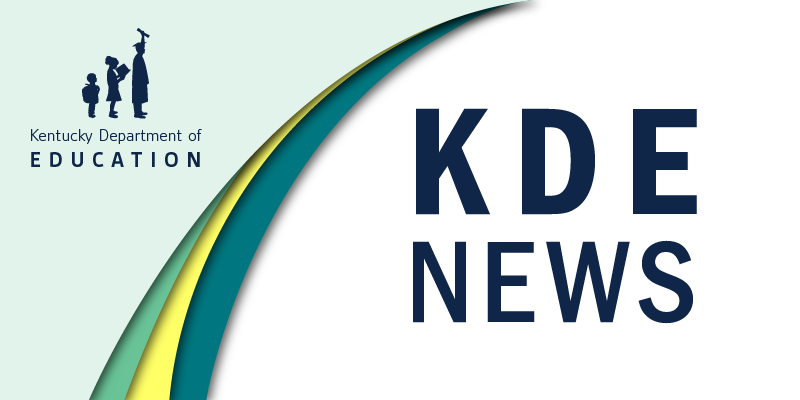
Members of the Kentucky School for the Deaf Signing Choir perform during the April 13 Kentucky Board of Education Meeting.
Photo by Bobby Ellis, April 13, 2016
(FRANKFORT, Ky.) – At its meeting in Frankfort April 13, the Kentucky Board of Education (KBE) discussed the development of a new accountability system for public schools under the Every Student Succeeds Act (ESSA).
“Our goal is to develop a system that is fair, reliable, easier to understand and more meaningful for kids,” Commissioner of Education Stephen Pruitt said. ”If we don’t come out with an accountability system focused on students, then we’ve failed. It can’t be about what’s easiest for adults. The system needs to promote what’s best for students.”
The Kentucky Department of Education is holding Town Hall meetings across the state to gather public input on what educators, parents and other shareholders would like to see in the system. Shareholders also may submit thoughts through a special e-mail, KyEdListens@education.ky.gov.
“This isn’t an attempt to throw the baby out with the bath water, but to develop a system that is truly reflective of Kentucky values,” Pruitt said.
The commissioner said that soon he would name a steering committee, which represents all shareholder groups, including legislators, to work with the public feedback and ESSA requirements to develop Kentucky’s new accountability system. Pruitt said he also will name a committee that will anticipate and try to head off any unintended consequences from the proposed system. The ESSA requires the system to be in place by the 2017-18 school year.
At its meeting, the board also heard an update on AdvanceKentucky. The program expands access to and participation and success in Advanced Placement (AP) courses, particularly among student populations traditionally underrepresented in these courses. Since AdvanceKentucky began in 2008, the number of students taking AP courses and earning qualifying scores has more than doubled. Data show that students who participate in AdvanceKentucky are significantly more likely than their counterparts to be prepared for and go to college, earn higher GPAs and graduate in four years. In addition, more AdvanceKentucky minority and low-income students go to college and significantly fewer enroll in one or more remedial courses.
As part of her presentation, AdvanceKentucky Executive Director Joanne Lang announced the ninth cohort of high schools that will participate in the program:
- Boyd County
- Campbellsville Independent
- Central (Jefferson County)
- Elizabethtown Independent
- Fleming County
- Mason County
- Nelson County
- Thomas Nelson (Nelson County)
AdvanceKentucky now reaches students in 109 high schools in 79 of the state’s 173 districts. Lang estimates that by the time current schools are in the seventh year of the program, students will earn qualifying scores and college credits in math, science and English alone that equate to $10 million in tuition savings every year, based on the average tuition for regional universities.
The board heard updates on Teach for America, the 2016-18 biennial budget and education legislation from the 2016 session of the General Assembly. Kentucky Department of Education staff provided a status update on state assistance in Fleming and Robertson counties and Caverna Independent, as well as an update on state management in Breathitt and Menifee counties. All districts were reported to be making progress.
At its meeting, the board named Boone County, Corbin Independent and Metcalfe County school districts as new Districts of Innovation and approved select waivers for each district. KRS 156.108 and 160.107 provide Kentucky public school districts the opportunity to apply to the KBE for an exemption from certain administrative regulations and statutory provisions, as well as seek waivers of local board policy, in an effort to improve the learning of students.
In other action, the board approved the repeal of several regulations:
- 704 KAR 3:471, Repeal of 704 KAR 3:470, Ranking of Certified School Personnel
- 780 KAR 4:031, Repeal of 780 KAR 4:030, Standards for Secondary Programs and 780 KAR 7:071, Repeal of 780 KAR 7:070, Equipment Insurance
- 780 KAR 7:060, Equipment Inventory
The board heard the first reading for the repeal of:
- 704 KAR 4:041, Repeal of 703 KAR 4:040, Interim Methods for Verifying Successful Completion of the Primary Program
- 704 KAR 3:342, Repeal of 704 KAR 3:340, Commonwealth Diploma Program
In addition, the board approved:
- A new district facility plan for the Laurel County school district.
- A district facility plan amendment for Hardin County school district.
- A request from the Fort Thomas Independent School District for waiver of 702 KAR 5:060, Section 6(2).
- A waiver request from the Pike County school district of Section 305 of the Kentucky Facility Programming and Construction Criteria, as Incorporated by Reference into 702 KAR 4:180.
- An acquisition and site development costs request from the Martin County school district.
- A waiver request from Boone County school district of the Requirements of Documents Related to Construction Management as Adviser Incorporated by Reference into 702 KAR 4:160, Capital Construction Process.
- The appointment of Darryl Billings of Clay City to an at-large position on the Kentucky High School Athletic Association Board of Control.

A member of the Kentucky School for the Deaf Signing Choir perform during the Kentucky Board of Education meeting.
Photo by Bobby Ellis, April 13, 2016
One of the highlights of the meeting was the attendance of the Kentucky School for the Deaf Signing Choir, which performed several numbers for the Kentucky Board of Education.
The agenda for the meeting and supporting materials are available on the board’s online portal.
The next regular board meeting is scheduled for June 8 in Frankfort.




Leave A Comment